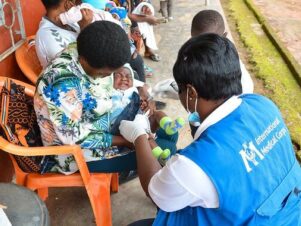To ensure that those who are sick of typhoid receive appropriate treatment and timely medical attention, the accurate diagnosis of typhoid fever is highly critical. Due to both the nature of the disease and difficulties with available diagnostic test tools, the current diagnosis of typhoid fever presents many challenges. Influenza, pneumonia, malaria and other febrile illnesses have similar symptoms to typhoid fever. This demonstrates the need for more accurate and rapid diagnostic tests for typhoid fever as it leads to frequent misdiagnosis.
Currently available diagnostics for typhoid fever are limited both in their practicality in a low-resource, high-burden setting and in their ability to identify the bacterium that causes Salmonella Salmonella Typhi (enterica serovar Typhi). Based on your travel history and your medical and symptoms, your doctor will likely suspect typhoid fever. Finding Salmonella typhi in cultures of blood or other body tissues or fluids helps to confirm the diagnosis of typhoid fever. Typhoid fever is most common in South America, Africa, the Indian subcontinent, and Southeast Asia.
Typhoid fever diagnostic tests
Isolation by blood culture of the Salmonella Typhi bacterium is required for a definitive diagnosis of typhoid fever, according to the World Health Organization. Although it still has serious practical limitations, this method is considered the gold standard for diagnosing typhoid fever. Blood cultures for typhoid fever diagnosis are expensive and require specialized laboratory facilities and personnel to perform them.
By testing blood, stool, or urine samples lab technicians are able confirm the diagnosis of typhoid fever. To detect the disease-causing Salmonella typhi bacteria, they’re are examined under a microscope. You may need to run a variety of tests since the typhoid causing bacteria doesn't always show up the first time.
A more accurate way to diagnose typhoid fever is analyzing a bone marrow sample. However, it is generally only used when other tests are inconclusive since collecting a sample is painful and time consuming. Other members of your family may also need to be tested if typhus is confirmed, just in case you transmitted the infection to them.
Tissue culture or body fluids
Other tests can be used to confirm a suspected typhoid infection, although having a culture test is the most common diagnostic test, such test include a test that checks the DNA of the typhoid bacteria in the blood or a test to detect antibodies to typhoid bacteria in the blood.
Due to the nonspecific nature of typhoid fever symptoms, the diagnosis of typhoid fever is based on clinical criteria, and this is challenging due to these limitations in most resource-limited settings. Because many other diseases, such as malaria and dengue fever have symptoms similar to typhoid fever, patients are often misdiagnosed. More serious complications and drug resistance can result from the difficulties in accurately providing proper treatment and diagnosing typhoid fever.
Other methods which are easier and less expensive to do include urine or stool cultures, are less accurate. Due to cross-reactivity with other infectious agents, the Widal test which is an inexpensive and simple typhoid test developed in the late 19th century, should not be used alone for diagnosis, as it is often inaccurate.
Developing typhoid fever diagnostics test
With the goal of overcoming the shortcomings of existing methods in a cost-effective manner and rapidly providing accurate results, various typhus diagnostics are currently being developed. Three rapid serology-based tests have shown promising initial results, Test-It Typhoid (KIT), TUBEX®, and Typhidot. However, they have not been evaluated in larger studies in community settings.
In addition, new areas of scientific research have emerged in recent years which may offer potential future solutions for typhoid fever diagnosis, including metabolomics and transcriptomics, but more research and investment is needed in this area.
Typhoid fever treatment
The only effective treatment for typhus is antibiotic therapy.
Commonly antibiotics being prescribed include:
Azithromycin (Zithromax):
If the bacteria are resistant to ciprofloxacin or when a person cannot take ciprofloxacin then Zithromax can be used.
Ciprofloxacin (Cipro):
Doctors in cameroon often prescribe this medication for all adults except for pregnant females. Ofloxacin another similar medication may also be used. Unfortunately, this type of antibiotic types no longer detects many Salmonella typhi bacteria, especially the strains reported in Southeast Asia.
Ceftriaxone:
An alternative for more serious or complicated infections and for people such as children, who may not be ciprofloxacin candidates. It is an injectable antibiotic.
Long-term use of these antibiotic drugs can lead to the development of antibiotic-resistant bacteria as side effects.
How to prepare to see a health care provider
If you have mild typhoid-like symptoms after returning from a trip abroad then call your doctor. If your symptoms are severe, call your local emergency number or go to an emergency room.
This is some ideas to help you prepare and know what to expect from your health care provider.
Collect these information before you go:
Appointment limits:
Ask if there are any restrictions that you should be aware of before your visit. Without a blood test, your doctor cannot confirm typhoid fever and can advise steps to reduce your risk of spreading to others the potentially infectious disease.
Past symptoms:
note the date and symptoms you are experiencing and.
Recent contact with a possible infection sources:
Be ready to describe in detail international travel, including the dates of your travel and the countries you will be visiting.
Other medical conditions:
List your key medical and vaccination history, including any other conditions you are treating and any vitamins, supplements, or medications you are taking.
Questions to ask your health care provider:
So you can make the most of your time with your doctor, write down your questions ahead of time.
While investments in better typhoid fever diagnostics can help the scientific and global community continue to better our understanding of the overall typhoid fever burden, we know that typhoid fever is a significant public health problem and prevention solutions and proven treatment are now available. By accelerating access typhoid vaccines, sanitation, and to clean water, we can improve health save lives, without waiting for better typhoid diagnosis.







